On February 27-28, 2025, the III Russian Congress with International Participation on Medical Microbiology and Infectology (RCMMI) was held in Moscow. The Congress became a key platform for the meeting of members of the professional community—experts united by the common idea of developing a new and exceptionally important medical specialty—"Medical Microbiology." The event was attended by more than 200 lecturers—experts from Russia, Kazakhstan, Belarus, Abkhazia, Burkina Faso, Germany, India, Iraq, China, Portugal, and Serbia. Over the course of two days, the Congress and the major industry exhibition were visited by 2,100 specialists.
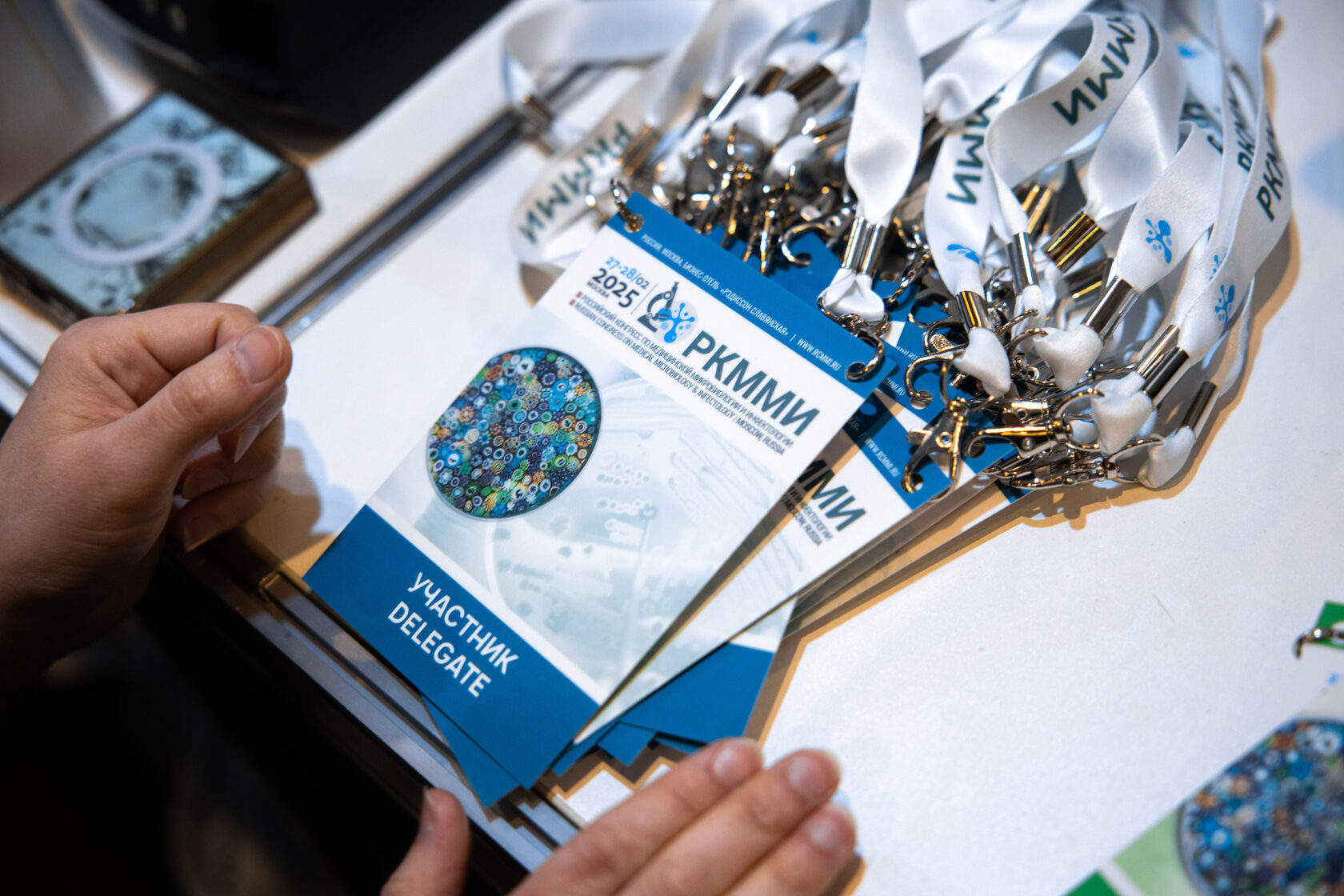
The Congress was organized by the Ministry of Health of the Russian Federation, the Russian Academy of Sciences, the "National Medical Research Center for Obstetrics, Gynecology, and Perinatology named after Academician V.I. Kulakov" of the Ministry of Health of the Russian Federation, the Russian Medical Academy of Continuous Professional Education (RMANPO), the Association of Medical Microbiologists (AMM), with participation of the Association of Bacteriologists and the Association of Specialists and Organizations of Laboratory Service "Federation of Laboratory Medicine."
The meeting of the specialized commissions
The opening of the III Russian Congress with International Participation on Medical Microbiology and Infectology (RCMII) was marked by a significant event for the entire professional community — the first joint open meeting of the Ministry of Health of the Russian Federation's specialized commissions on medical microbiology and clinical microbiology, and antimicrobial resistance, chaired by Corresponding Member of the Russian Academy of Sciences, Doctor of Medical Sciences, Professor, Director of the Institute of Microbiology, Antimicrobial Therapy, and Epidemiology of the Federal State Budgetary Institution "NMRC for Obstetrics, Gynecology and Perinatology named after Academician V.I. Kulakov" of the Ministry of Health of the Russian Federation, Acting Head of the Department of Medical Microbiology named after Academician Z.V. Ermolyeva of the Federal State Budgetary Educational Institution of Continuing Professional Education RMANPO of the Ministry of Health of the Russian Federation, Professor of the Department of Microbiology and Virology at the Institute of Preventive Medicine named after Z.P. Solovyov, Federal State Autonomous Educational Institution of Higher Education Pirogov Russian National Research Medical University of the Ministry of Health of the Russian Federation (RNRMU), and Chief Freelance Specialist in Medical Microbiology of the Ministry of Health of the Russian Federation, Tatyana Valeryevna Priputnevich, and Corresponding Member of the Russian Academy of Sciences, Doctor of Medical Sciences, Professor, President of the IACMAC Association, Rector of the Federal State Budgetary Educational Institution of Higher Education Smolensk State Medical University of the Ministry of Health of the Russian Federation, Chief Freelance Specialist in Clinical Microbiology and Antimicrobial Resistance of the Ministry of Health of the Russian Federation, Roman Sergeevich Kozlov.
The meeting of the specialized commissions
The opening of the III Russian Congress with International Participation on Medical Microbiology and Infectology (RCMII) was marked by a significant event for the entire professional community — the first joint open meeting of the Ministry of Health of the Russian Federation's specialized commissions on medical microbiology and clinical microbiology, and antimicrobial resistance, chaired by Corresponding Member of the Russian Academy of Sciences, Doctor of Medical Sciences, Professor, Director of the Institute of Microbiology, Antimicrobial Therapy, and Epidemiology of the Federal State Budgetary Institution "NMRC for Obstetrics, Gynecology and Perinatology named after Academician V.I. Kulakov" of the Ministry of Health of the Russian Federation, Acting Head of the Department of Medical Microbiology named after Academician Z.V. Ermolyeva of the Federal State Budgetary Educational Institution of Continuing Professional Education RMANPO of the Ministry of Health of the Russian Federation, Professor of the Department of Microbiology and Virology at the Institute of Preventive Medicine named after Z.P. Solovyov, Federal State Autonomous Educational Institution of Higher Education Pirogov Russian National Research Medical University of the Ministry of Health of the Russian Federation (RNRMU), and Chief Freelance Specialist in Medical Microbiology of the Ministry of Health of the Russian Federation, Tatyana Valeryevna Priputnevich, and Corresponding Member of the Russian Academy of Sciences, Doctor of Medical Sciences, Professor, President of the IACMAC Association, Rector of the Federal State Budgetary Educational Institution of Higher Education Smolensk State Medical University of the Ministry of Health of the Russian Federation, Chief Freelance Specialist in Clinical Microbiology and Antimicrobial Resistance of the Ministry of Health of the Russian Federation, Roman Sergeevich Kozlov.
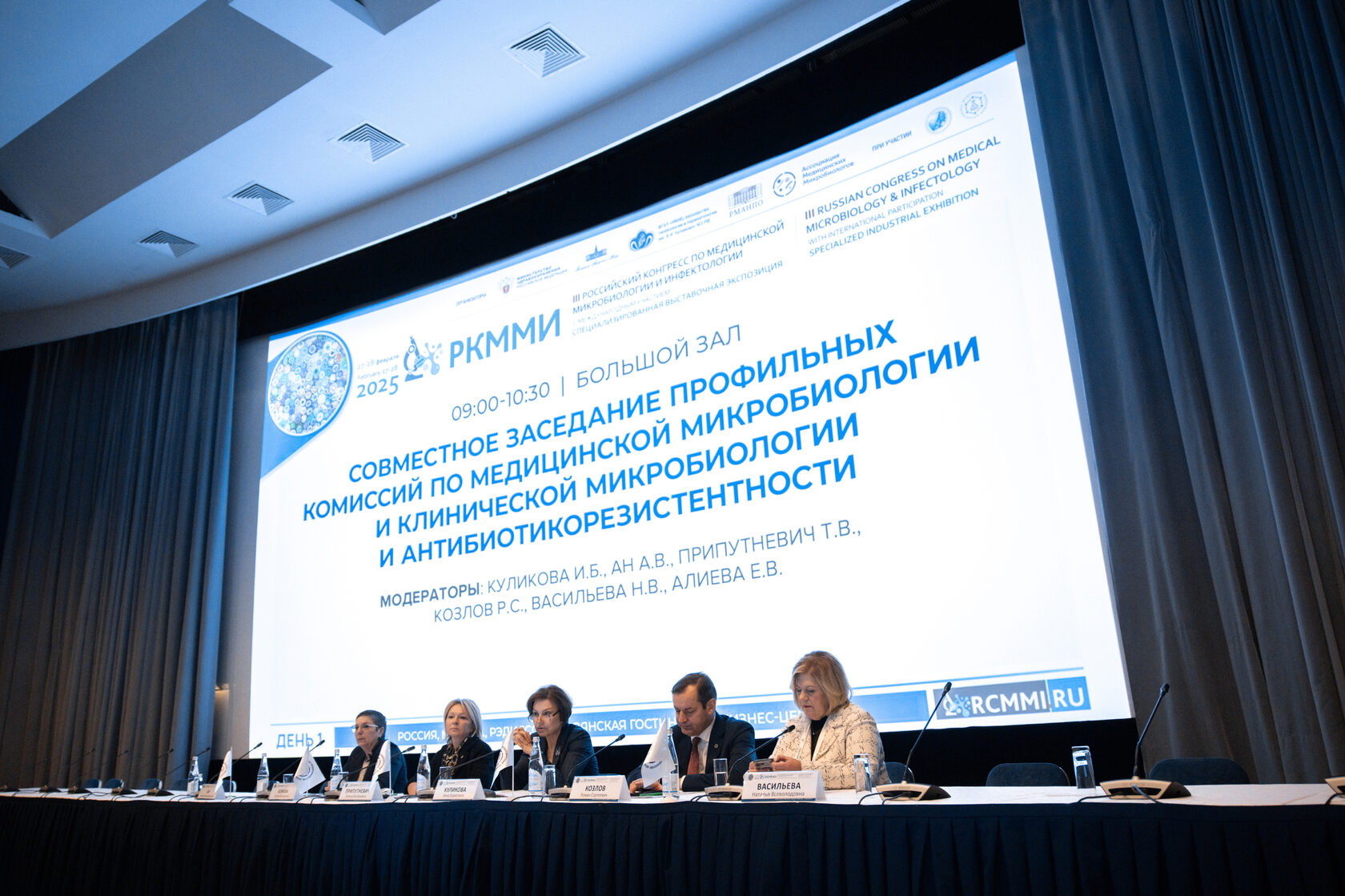
The meeting of the specialized commissions was opened by Tatyana Valeryevna Priputnevich. In her speech, she summarized the performance results of 2024, discussed the proposals for changes to the regulatory and legal framework submitted to the Ministry of Health of the Russian Federation during the reporting period, and outlined new tasks that need to be addressed in connection with the transition to the new specialty, both for specialists with higher medical and non-medical education, as well as those with secondary medical education. Tatyana Valeryevna called the work of the specialized commission satisfactory, noting that "at least 90% of the planned goals were achieved."
Roman Sergeevich Kozlov, while presenting digital services in antimicrobial resistance monitoring and the necessity and importance of digitalization in medicine, emphasized that despite an obvious significance of modern methods and technologies for the effective operation of laboratories, the primary aspect is the continuous education of medical personnel. Roman Sergeevich expressed confidence that, under current conditions, the importance of medical microbiology in achieving the main goal — improving the quality of medical care — will increase year by year.
Doctor of Biological Sciences, Professor, Director of the P.N. Kashkin Institute of Medical Mycology, and Chief Freelance Specialist in Clinical Microbiology and Antimicrobial Resistance of the Ministry of Health of the Russian Federation in the Northwestern Federal District, Natalya Vsevolodovna Vasilyeva, spoke about the updating of the professional standard "Specialist in the Field of Medical Microbiology." Natalya Vsevolodovna proudly highlighted the achievements of the professional community in developing the new medical specialty over the past 15 years and discussed the new challenges facing medical microbiologists.
Doctor of Medical Sciences, Associate Professor, Professor of the Department of Medical Microbiology named after Academician Z.V. Ermolyeva, Federal State Budgetary Educational Institution of Continuing Professional Education RMANPO of the Ministry of Health of the Russian Federation, Chief Freelance Specialist in Medical Microbiology of the Ministry of Health of the Russian Federation in the North-Caucasus Federal District, Elena Vsevolodovna Alieva, presented for consideration the new professional standard "Specialist in the Field of Medical Microbiology with Secondary Medical Education." She noted, "At this stage, we are facing a harmonious situation where we can introduce changes in the nomenclature of specialties and positions in the qualification requirements for specialists with secondary medical education and approve the professional standard 'Specialist in the Field of Medical Microbiology with Secondary Medical Education'." Elena Vsevolodovna provided a detailed commentary on the reasons, necessity, and timeliness of introducing this new regulatory document.
Roman Sergeevich Kozlov, while presenting digital services in antimicrobial resistance monitoring and the necessity and importance of digitalization in medicine, emphasized that despite an obvious significance of modern methods and technologies for the effective operation of laboratories, the primary aspect is the continuous education of medical personnel. Roman Sergeevich expressed confidence that, under current conditions, the importance of medical microbiology in achieving the main goal — improving the quality of medical care — will increase year by year.
Doctor of Biological Sciences, Professor, Director of the P.N. Kashkin Institute of Medical Mycology, and Chief Freelance Specialist in Clinical Microbiology and Antimicrobial Resistance of the Ministry of Health of the Russian Federation in the Northwestern Federal District, Natalya Vsevolodovna Vasilyeva, spoke about the updating of the professional standard "Specialist in the Field of Medical Microbiology." Natalya Vsevolodovna proudly highlighted the achievements of the professional community in developing the new medical specialty over the past 15 years and discussed the new challenges facing medical microbiologists.
Doctor of Medical Sciences, Associate Professor, Professor of the Department of Medical Microbiology named after Academician Z.V. Ermolyeva, Federal State Budgetary Educational Institution of Continuing Professional Education RMANPO of the Ministry of Health of the Russian Federation, Chief Freelance Specialist in Medical Microbiology of the Ministry of Health of the Russian Federation in the North-Caucasus Federal District, Elena Vsevolodovna Alieva, presented for consideration the new professional standard "Specialist in the Field of Medical Microbiology with Secondary Medical Education." She noted, "At this stage, we are facing a harmonious situation where we can introduce changes in the nomenclature of specialties and positions in the qualification requirements for specialists with secondary medical education and approve the professional standard 'Specialist in the Field of Medical Microbiology with Secondary Medical Education'." Elena Vsevolodovna provided a detailed commentary on the reasons, necessity, and timeliness of introducing this new regulatory document.
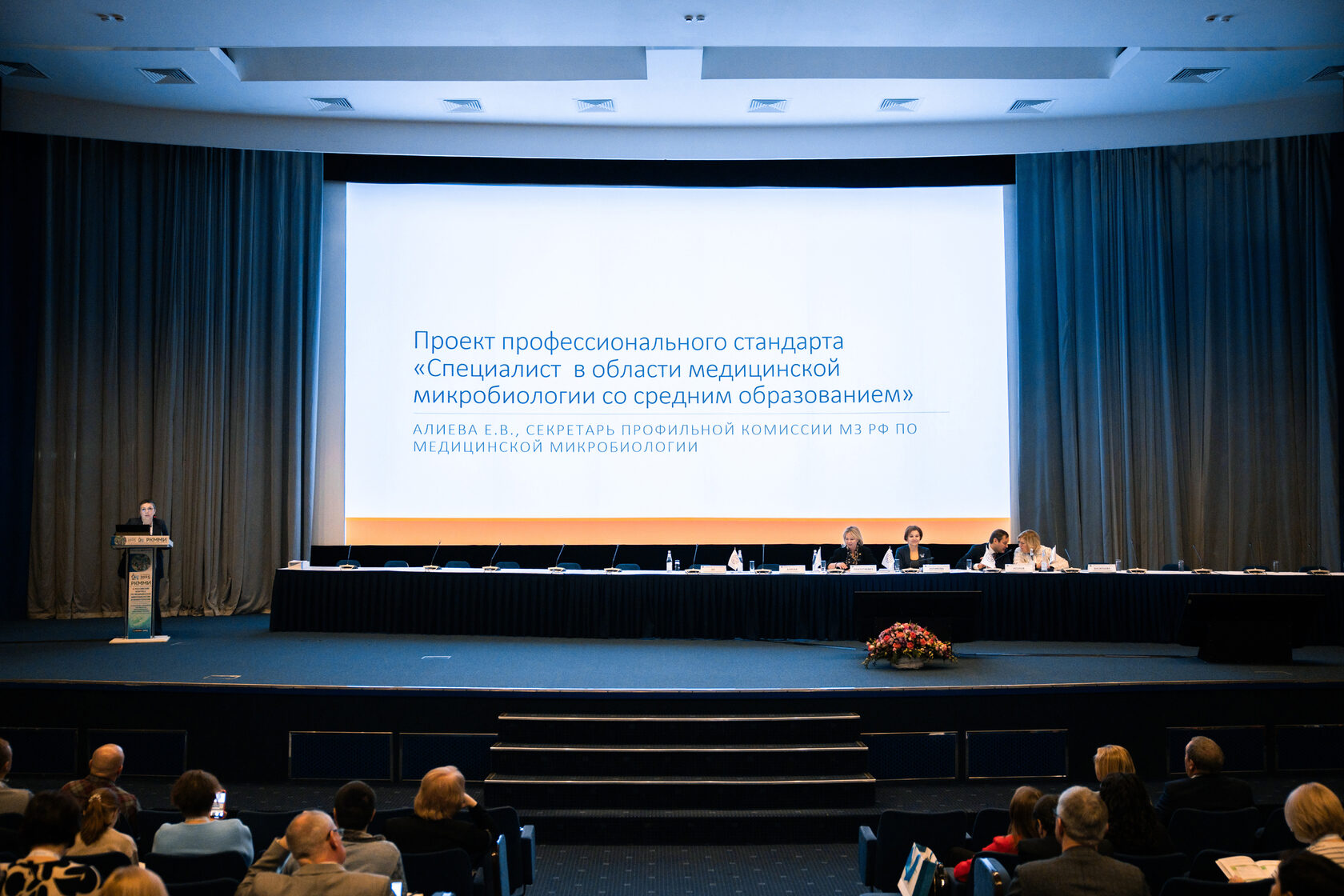
Solemn Opening. Plenary Session
As part of the official opening ceremony of the 3rd RCMII, the participants were addressed by the leaders of Russian healthcare:
The Minister of Health of the Russian Federation, Mikhail Albertovich Murashko, sent a welcoming message to the participants of the Congress, in which he noted that "medical microbiology is the foundation of biological security in the country, and protection of the population from dangerous infectious factors directly depends on professionalism of specialists." The Minister wished the attendees productive work and professional development.
The participants heard welcoming addresses from the Head of the Federal Service for Surveillance on Consumer Rights Protection and Human Well-being, the Chief State Sanitary Doctor of the Russian Federation, Anna Yurievna Popova, and the Deputy Minister of Science and Higher Education of the Russian Federation, Denis Sergeevich Sekirinsky.
The welcoming address was delivered by Andrei Nikolaevich Plutnitsky, Deputy Minister of Health of the Russian Federation. He stated, "A distinctive feature of this event is the serious interdepartmental cooperation of all relevant authorities and organizations." Andrei Nikolaevich also thanked his colleagues for their tremendous contributions in the fight against the pandemic and called for unity and resilience in the face of new challenges.
As part of the official opening ceremony of the 3rd RCMII, the participants were addressed by the leaders of Russian healthcare:
The Minister of Health of the Russian Federation, Mikhail Albertovich Murashko, sent a welcoming message to the participants of the Congress, in which he noted that "medical microbiology is the foundation of biological security in the country, and protection of the population from dangerous infectious factors directly depends on professionalism of specialists." The Minister wished the attendees productive work and professional development.
The participants heard welcoming addresses from the Head of the Federal Service for Surveillance on Consumer Rights Protection and Human Well-being, the Chief State Sanitary Doctor of the Russian Federation, Anna Yurievna Popova, and the Deputy Minister of Science and Higher Education of the Russian Federation, Denis Sergeevich Sekirinsky.
The welcoming address was delivered by Andrei Nikolaevich Plutnitsky, Deputy Minister of Health of the Russian Federation. He stated, "A distinctive feature of this event is the serious interdepartmental cooperation of all relevant authorities and organizations." Andrei Nikolaevich also thanked his colleagues for their tremendous contributions in the fight against the pandemic and called for unity and resilience in the face of new challenges.
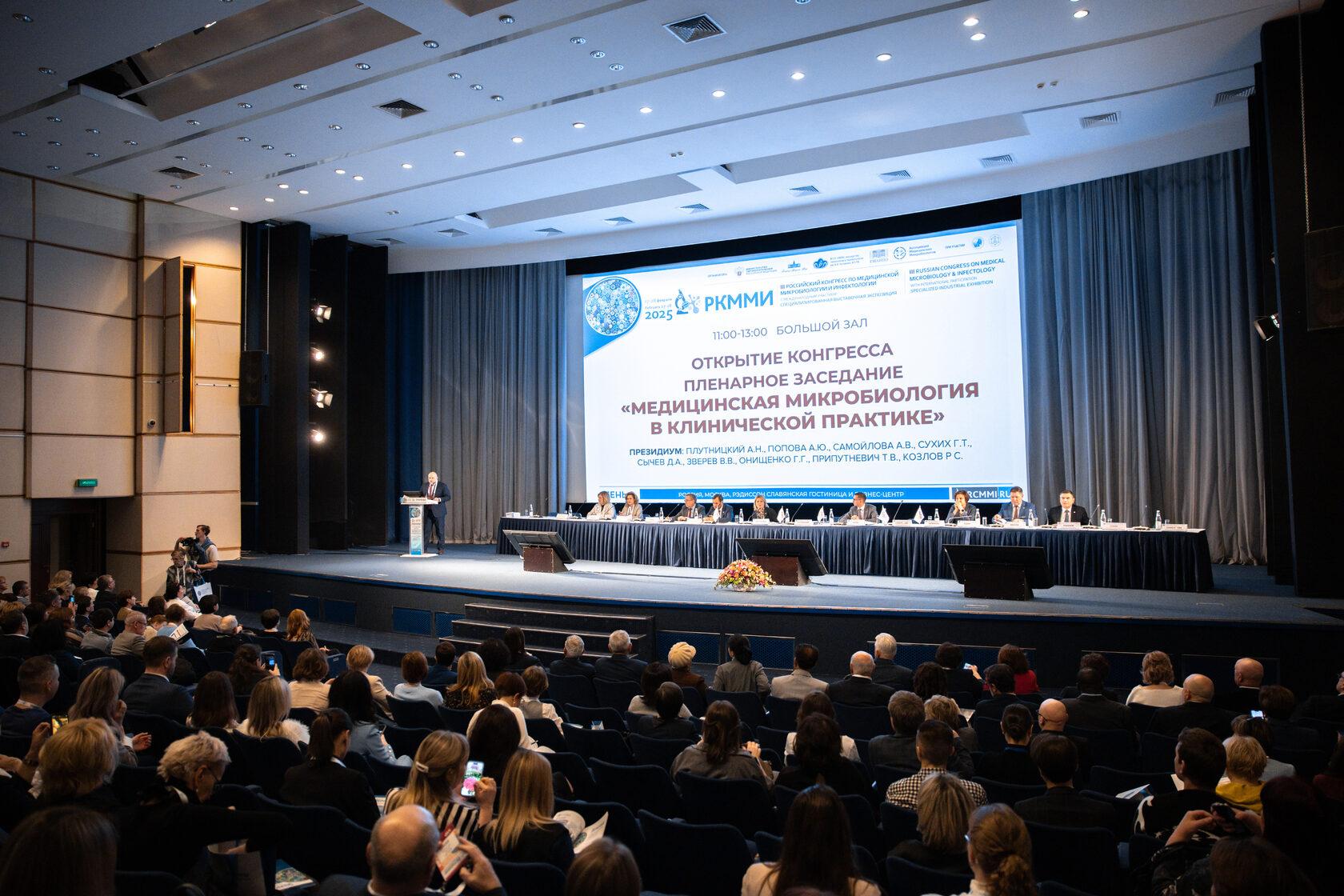
The head of the Federal Service for Surveillance in Healthcare, Alla Vladimirovna Samoilova, spoke about the situation with pharmaceutical products on the market and emphasized that it is now impossible to imagine the diagnosis and treatment of diseases caused by microorganisms without high-quality microbiological diagnostics. She also highlighted the need for technical maintenance and metrological control of laboratory equipment at the sites. Alla Vladimirovna specifically thanked the scientific community for its active development and significant increase in the number of domestic test systems.
In the plenary session, Corresponding Member of the Russian Academy of Sciences, Doctor of Medical Sciences, Director of the Federal State Budgetary Scientific Institution I.I. Mechnikov Research Institute of Vaccines and Sera, Professor of the Department of Microbiology, Virology, and Immunology named after A.A. Vorobyov at the F.F. Erisman Institute of Public Health, Sechenov First Moscow State Medical University, Oksana Anatolyevna Svitych, spoke about vaccines and vaccination prevention. In her report, Oksana Anatolyevna presented data on the current state of the issue on protecting the population from infectious diseases and the development of biopharmaceuticals for creating artificial active immunity.
Academician of the Russian Academy of Sciences, Doctor of Medical Sciences, Professor, and Acting Rector of the Federal State Budgetary Educational Institution of Continuing Professional Education RMANPO of the Ministry of Health of Russia, Dmitry Alekseevich Sychev, in his report, highlighted the experience of RMANPO in creating a new concept for implementing additional professional programs, including the new specialty "Medical Microbiology."
In the plenary session, Corresponding Member of the Russian Academy of Sciences, Doctor of Medical Sciences, Director of the Federal State Budgetary Scientific Institution I.I. Mechnikov Research Institute of Vaccines and Sera, Professor of the Department of Microbiology, Virology, and Immunology named after A.A. Vorobyov at the F.F. Erisman Institute of Public Health, Sechenov First Moscow State Medical University, Oksana Anatolyevna Svitych, spoke about vaccines and vaccination prevention. In her report, Oksana Anatolyevna presented data on the current state of the issue on protecting the population from infectious diseases and the development of biopharmaceuticals for creating artificial active immunity.
Academician of the Russian Academy of Sciences, Doctor of Medical Sciences, Professor, and Acting Rector of the Federal State Budgetary Educational Institution of Continuing Professional Education RMANPO of the Ministry of Health of Russia, Dmitry Alekseevich Sychev, in his report, highlighted the experience of RMANPO in creating a new concept for implementing additional professional programs, including the new specialty "Medical Microbiology."
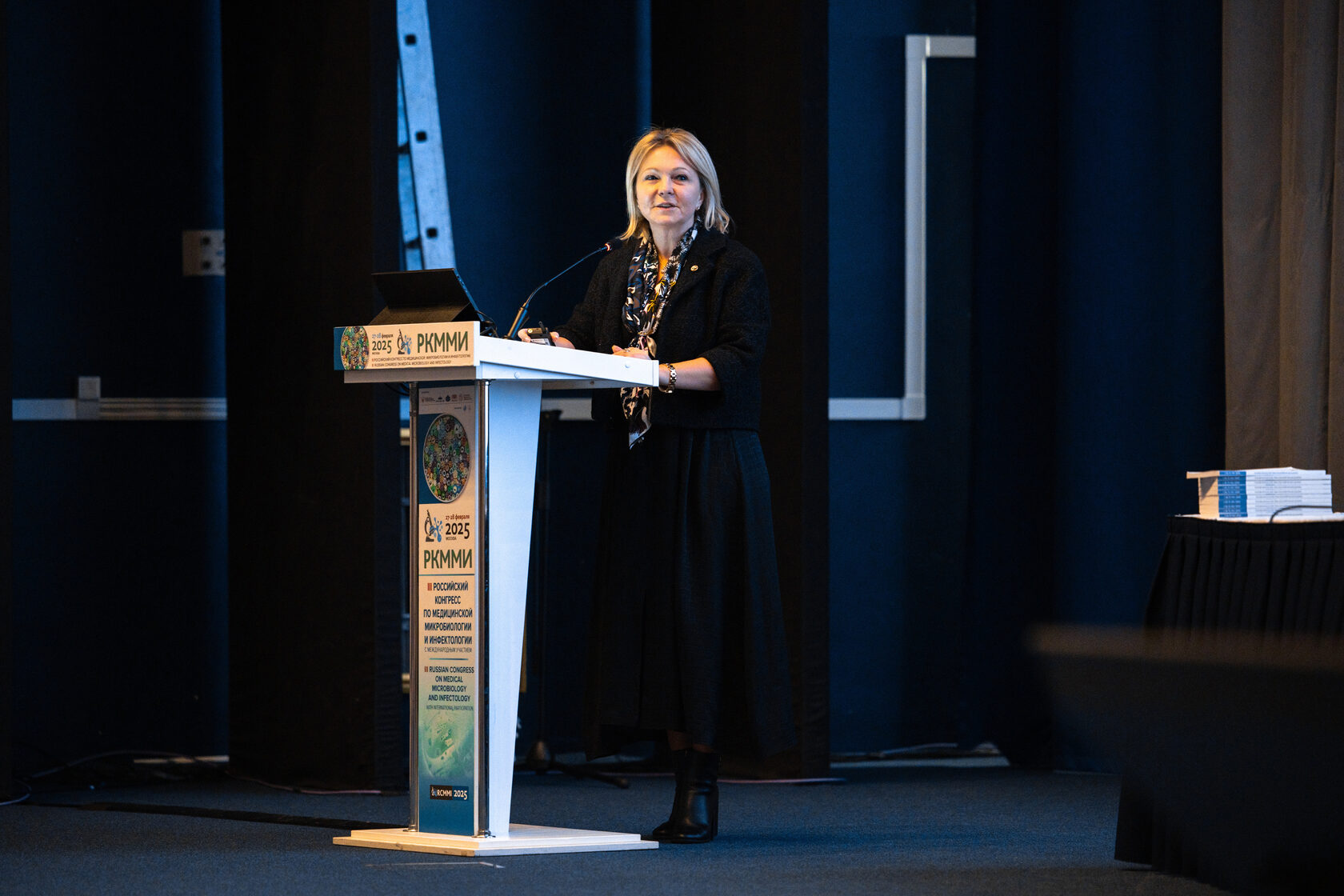
The Chief Freelance Specialist in Medical Microbiology of the Ministry of Health of Russia, Tatyana Valeryevna Priputnevich, delivered a report titled "Microbiological Monitoring – From Local to Global," in which she highlighted microbiological monitoring as a set of measures aimed at controlling the spread of pathogenic and opportunistic microorganisms, their circulation features, and properties. Modern approaches to implementing microbiological monitoring at various levels were considered, with the goal of promptly addressing biological threat prevention issues. In concluding her speech, Tatyana Valeryevna emphasized the importance of a multidisciplinary approach: "It is not by chance that we are organizing this event in such a way that not only medical microbiologists are present here but also experts from various fields, as the tactics chosen by an attending physician depend on our work — on the work of a medical microbiologist, a hospital epidemiologist, and a clinical pharmacologist, who must work to regulate the empirical antimicrobial resistance schemes in their organizations and develop sanitary and epidemiological measures aimed at preventing the spread of infections in their hospitals and among patients as a whole."
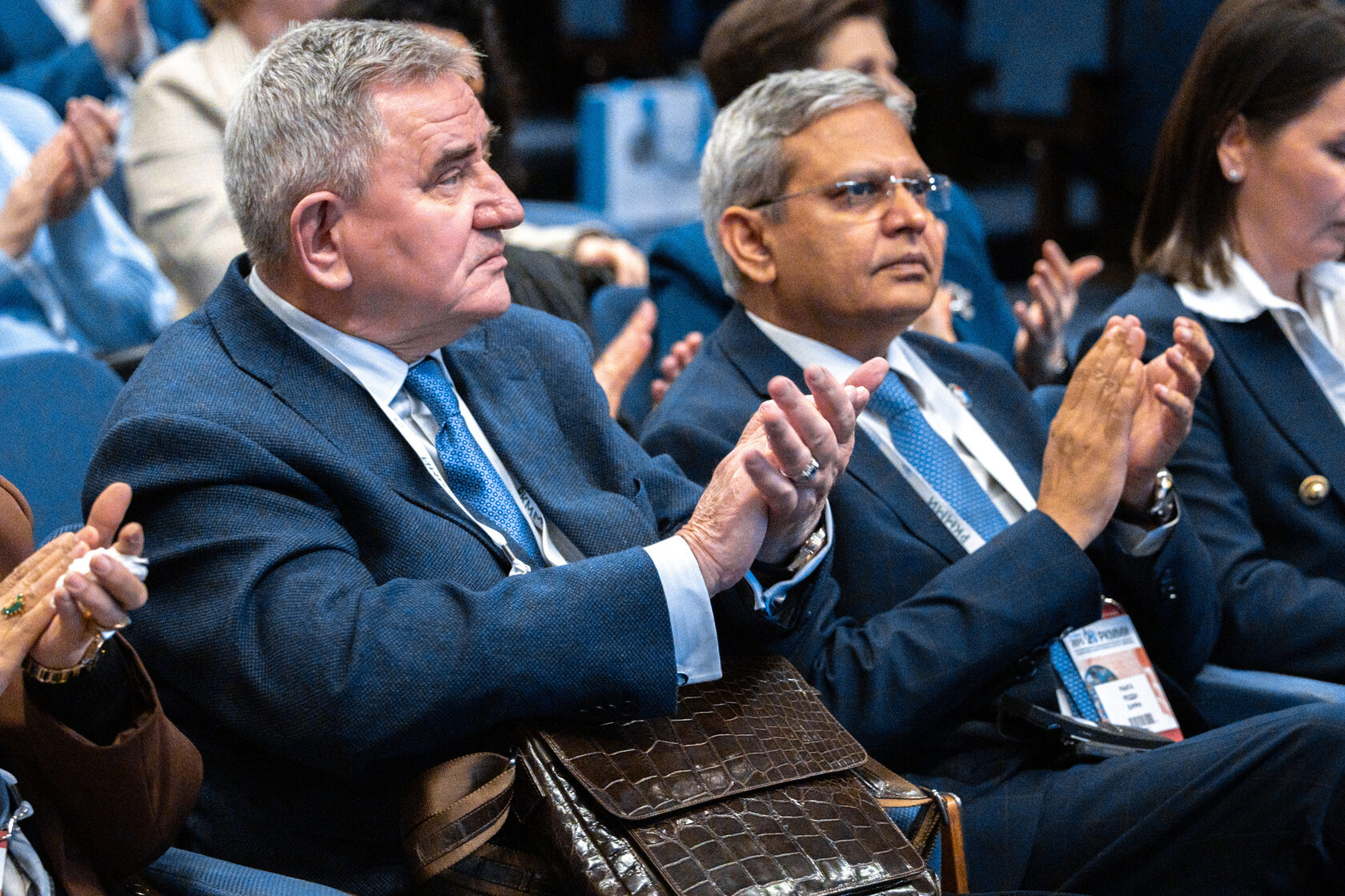
As part of the plenary session, presentations were made on the journal "Laboratory Diagnostics. Eastern Europe" and the National Guide "Medical Microbiology. Clinically Significant Microorganisms from the Perspective of Modern Taxonomy" — a book that was released for the opening of the III Russian Congress with International Participation on Medical Microbiology and Infectology (III RCMII).
Strategic Sessions
The highlight of the first day of the III RCMII were the strategic sessions dedicated to a unified goal — finding solutions to the problem of antibiotic resistance, which has now reached global scale.
The presidium of the session "Antimicrobial Resistance – The Invisible Pandemic" was chaired by Corresponding Member of the Russian Academy of Sciences, Doctor of Medical Sciences, Professor, President of the IACMAC Association, Rector of the Federal State Budgetary Educational Institution of Higher Education Smolensk State Medical University of the Ministry of Health of the Russian Federation, Chief Freelance Specialist in Clinical Microbiology and Antimicrobial Resistance of the Ministry of Health of the Russian Federation. The presidium also included Ivan Alekseevich Dyatlov, Academician of the Russian Academy of Sciences, MD, Professor, Director of the FBIS SSC PMB of Federal Service for the Oversight of Consumer Protection and Welfare; Vasily Gennadievich Akimkin, Academician of the Russian Academy of Sciences, MD, Professor, Director of the FBIS Central Research Institute of Epidemiology of Federal Service for the Oversight of Consumer Protection and Welfare; and Nikolai Ivanovich Briko, Academician of the Russian Academy of Sciences, MD, Professor, Honored Scientist of the Russian Federation, Director of the F.F. Erisman Institute of Public Health, Head of the Department of Epidemiology and Evidence-Based Medicine at the Sechenov First Moscow State Medical University of the Ministry of Health of the Russian Federation.
Strategic Sessions
The highlight of the first day of the III RCMII were the strategic sessions dedicated to a unified goal — finding solutions to the problem of antibiotic resistance, which has now reached global scale.
The presidium of the session "Antimicrobial Resistance – The Invisible Pandemic" was chaired by Corresponding Member of the Russian Academy of Sciences, Doctor of Medical Sciences, Professor, President of the IACMAC Association, Rector of the Federal State Budgetary Educational Institution of Higher Education Smolensk State Medical University of the Ministry of Health of the Russian Federation, Chief Freelance Specialist in Clinical Microbiology and Antimicrobial Resistance of the Ministry of Health of the Russian Federation. The presidium also included Ivan Alekseevich Dyatlov, Academician of the Russian Academy of Sciences, MD, Professor, Director of the FBIS SSC PMB of Federal Service for the Oversight of Consumer Protection and Welfare; Vasily Gennadievich Akimkin, Academician of the Russian Academy of Sciences, MD, Professor, Director of the FBIS Central Research Institute of Epidemiology of Federal Service for the Oversight of Consumer Protection and Welfare; and Nikolai Ivanovich Briko, Academician of the Russian Academy of Sciences, MD, Professor, Honored Scientist of the Russian Federation, Director of the F.F. Erisman Institute of Public Health, Head of the Department of Epidemiology and Evidence-Based Medicine at the Sechenov First Moscow State Medical University of the Ministry of Health of the Russian Federation.
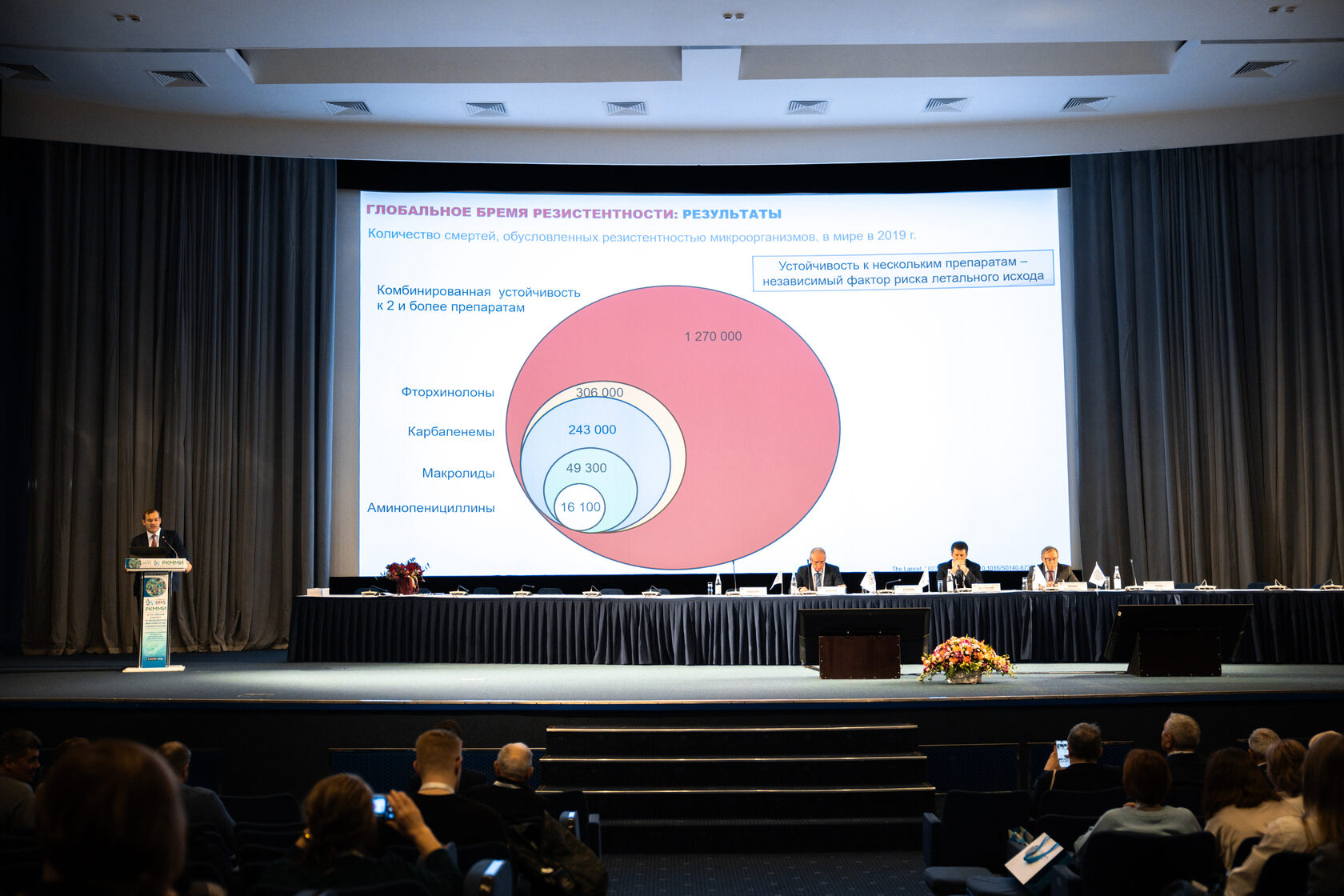
In the reports delivered by both domestic and international scientists, the current challenges faced by the medical community in treating infectious diseases were highlighted, both in Russia and globally. Experts provided data on the pathogens listed as priority by the WHO, as well as their genetic profiles that contribute to antimicrobial resistance. They also discussed the role of reference centers in ensuring biological safety in the Russian Federation.

Foreign speakers shared the experience of Burkina Faso and China in the fight against antimicrobial resistance.
The session "Innovations and Priorities in the Diagnosis and Treatment of Infections" was chaired by Corresponding Member of the Russian Academy of Sciences, Doctor of Medical Sciences, Professor, Director of the Institute of Microbiology, Antimicrobial Therapy, and Epidemiology at the "National Medical Research Center for Obstetrics, Gynecology, and Perinatology named after Academician V.I. Kulakov" of the Ministry of Health of Russia, and Chief Freelance Specialist in Medical Microbiology of the Ministry of Health of Russia, Tatyana Valeryevna Priputnevich. The session's presidium included: Doctor of Medical Sciences, Deputy Director for Scientific Work and Innovative Development of the National Medical Research Center for Phthisiopulmonology of the Ministry of Health of Russia, and Chief Freelance Specialist in Infectious Diseases of the Ministry of Health of Russia, Vladimir Petrovich Chulanov; Corresponding Member of the Russian Academy of Sciences, Doctor of Chemical Sciences, Deputy Director for Science, Head of the Laboratory of Proteolytic Enzymes in the Department of Peptide-Protein Technologies at the Institute of Biochemistry and Physiology of the Russian Academy of Sciences, Ivan Vitalyevich Smirnov; Doctor of Biological Sciences, Professor, Head of the Department of Medical Microbiology, and Head of the Chlamydia Laboratory at the Gamaleya National Center of Epidemiology and Microbiology of the Ministry of Health of Russia, Nailya Akhatovna Zigangirova; and Academician of the Serbian Academy of Sciences and Arts, Professor, Head of the Department of Microbial Genetics and Immunology at the Military Medical Academy of the Ministry of Defense of the Republic of Serbia, Professor at the University of Defense, Elizabeth Ristanovich.
The session "Innovations and Priorities in the Diagnosis and Treatment of Infections" was chaired by Corresponding Member of the Russian Academy of Sciences, Doctor of Medical Sciences, Professor, Director of the Institute of Microbiology, Antimicrobial Therapy, and Epidemiology at the "National Medical Research Center for Obstetrics, Gynecology, and Perinatology named after Academician V.I. Kulakov" of the Ministry of Health of Russia, and Chief Freelance Specialist in Medical Microbiology of the Ministry of Health of Russia, Tatyana Valeryevna Priputnevich. The session's presidium included: Doctor of Medical Sciences, Deputy Director for Scientific Work and Innovative Development of the National Medical Research Center for Phthisiopulmonology of the Ministry of Health of Russia, and Chief Freelance Specialist in Infectious Diseases of the Ministry of Health of Russia, Vladimir Petrovich Chulanov; Corresponding Member of the Russian Academy of Sciences, Doctor of Chemical Sciences, Deputy Director for Science, Head of the Laboratory of Proteolytic Enzymes in the Department of Peptide-Protein Technologies at the Institute of Biochemistry and Physiology of the Russian Academy of Sciences, Ivan Vitalyevich Smirnov; Doctor of Biological Sciences, Professor, Head of the Department of Medical Microbiology, and Head of the Chlamydia Laboratory at the Gamaleya National Center of Epidemiology and Microbiology of the Ministry of Health of Russia, Nailya Akhatovna Zigangirova; and Academician of the Serbian Academy of Sciences and Arts, Professor, Head of the Department of Microbial Genetics and Immunology at the Military Medical Academy of the Ministry of Defense of the Republic of Serbia, Professor at the University of Defense, Elizabeth Ristanovich.
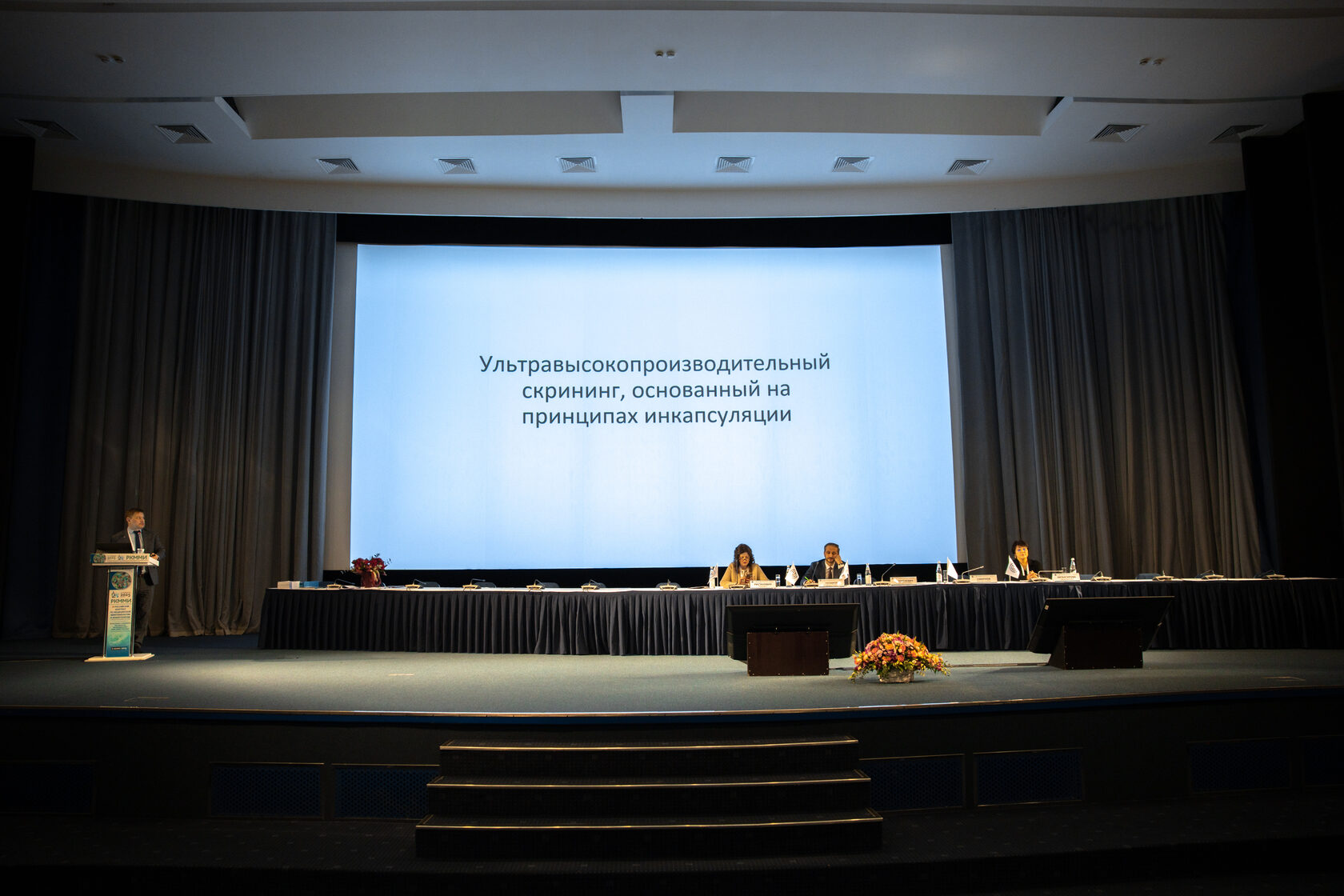
Russian and foreign speakers discussed innovative approaches to the treatment of infectious diseases, creation of effective drugs obtained through targeted synthesis, which not only have antimicrobial effects but also exhibit antivirulence properties.
Special attention was given to the global issue of biological security. Experts agreed that, under current conditions, predicting biological threats related to emergence of epidemics and pandemics is impossible without development of artificial intelligence.
Olympiad. Competitions
As part of the Congress, the III All-Russian Student Olympiad in Medical Microbiology named after Z.V. Ermolyeva was held. More than 500 students from 57 universities, 42 cities and towns, and 5 countries participated in the selection stage. The top winners were those who scored the highest number of points. 90 students made it to the final, where they had to solve case tasks: determine the genus and species of microorganisms based on illustrations and descriptions of their properties. The finalists also participated in a team quiz consisting of three sections: "Microworld," "Where is the Logic?" and "Microbiology in Culture."
The winners were awarded at a meeting of the members of the Association of Medical Microbiologists.
Special attention was given to the global issue of biological security. Experts agreed that, under current conditions, predicting biological threats related to emergence of epidemics and pandemics is impossible without development of artificial intelligence.
Olympiad. Competitions
As part of the Congress, the III All-Russian Student Olympiad in Medical Microbiology named after Z.V. Ermolyeva was held. More than 500 students from 57 universities, 42 cities and towns, and 5 countries participated in the selection stage. The top winners were those who scored the highest number of points. 90 students made it to the final, where they had to solve case tasks: determine the genus and species of microorganisms based on illustrations and descriptions of their properties. The finalists also participated in a team quiz consisting of three sections: "Microworld," "Where is the Logic?" and "Microbiology in Culture."
The winners were awarded at a meeting of the members of the Association of Medical Microbiologists.
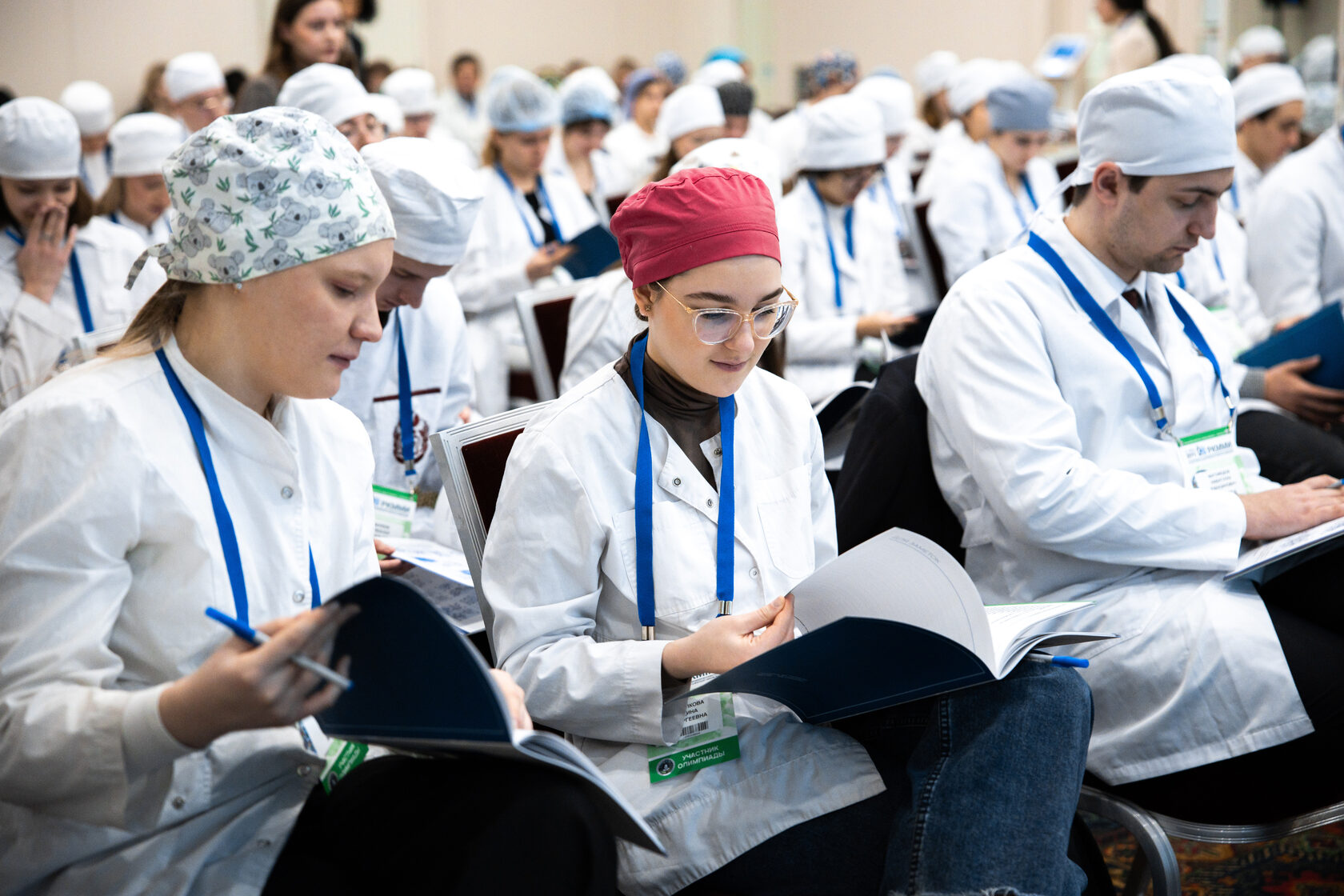
The partner of the Olympiad was the R-Pharm Group of Companies, an international medical biotechnology company that develops integrated healthcare solutions.
At the RCMMI, a poster session was held in a digital format. At least 54 specialists participated in the competition. The reports were broadcast on monitors in the exhibition area, and a collection of reports was also posted on the congress website.
A video contest on "Antimicrobial Resistance" was organized for students of general education institutions. Young microbiologists, the winners of the event, were awarded on the first day of the Congress. The partner of the video contest was the «Erba» company being the official representative of the international holding Erba Group in Russia, offering nearly the entire range of solutions for clinical laboratory diagnostics.
The Scientific Program Events
As part of the III RCMMI, more than 25 sessions were held — each of them became a bright and memorable event for the participants of the Congress.
At the RCMMI, a poster session was held in a digital format. At least 54 specialists participated in the competition. The reports were broadcast on monitors in the exhibition area, and a collection of reports was also posted on the congress website.
A video contest on "Antimicrobial Resistance" was organized for students of general education institutions. Young microbiologists, the winners of the event, were awarded on the first day of the Congress. The partner of the video contest was the «Erba» company being the official representative of the international holding Erba Group in Russia, offering nearly the entire range of solutions for clinical laboratory diagnostics.
The Scientific Program Events
As part of the III RCMMI, more than 25 sessions were held — each of them became a bright and memorable event for the participants of the Congress.
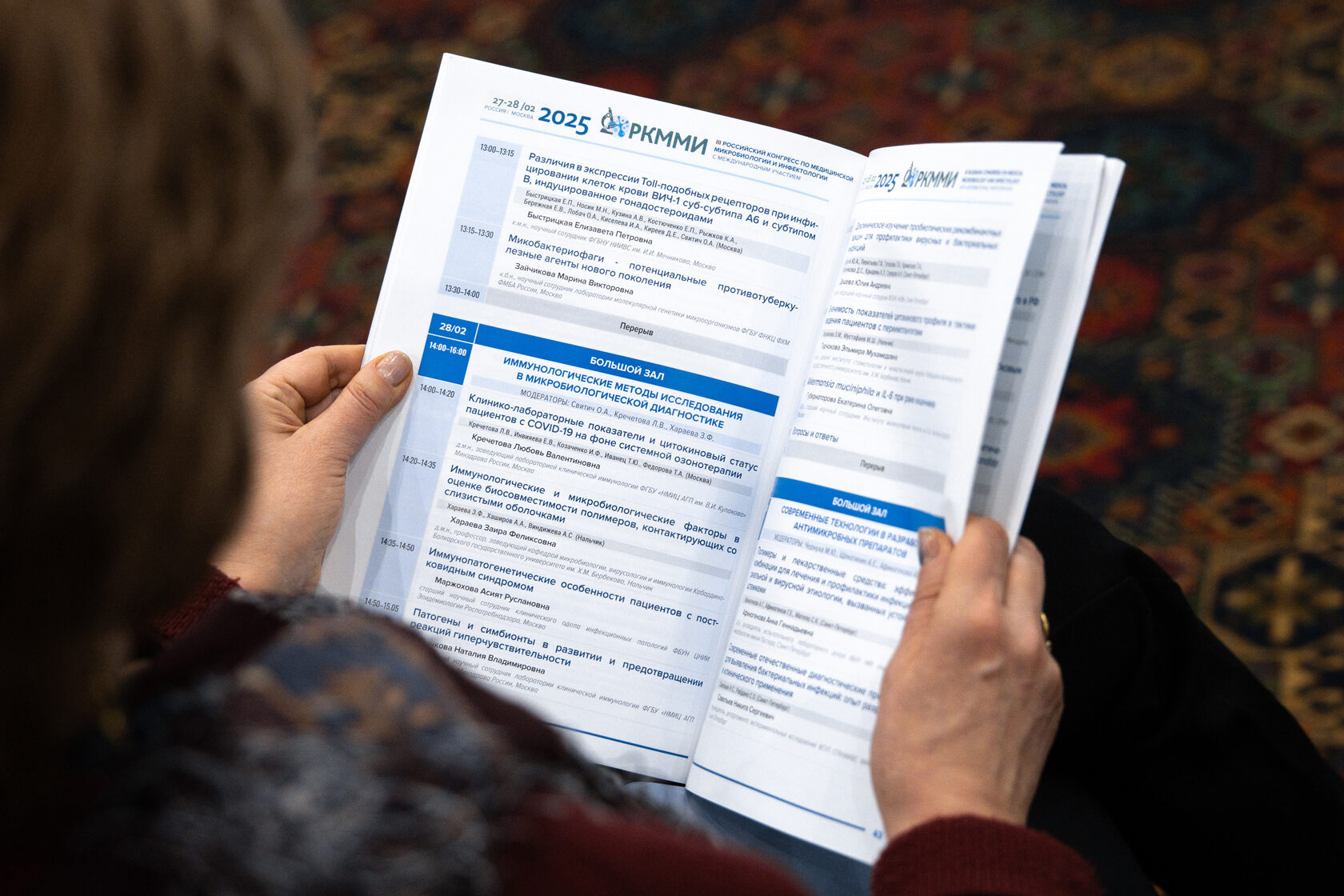
On February 28, the session "Team Approach in Microbiological Monitoring in Medical Organizations" took place. The reports were dedicated to current issues related to ensuring epidemiological safety in medical activities, clinical audits of infectious and inflammatory diseases in neonatal hospitals as an important tool for improving medical care quality and optimizing healthcare. The audience was introduced to the diagnostic capabilities of the medical microbiology laboratory of the State Autonomous Healthcare Institution of the Sverdlovsk Region, the "Regional Children's Clinical Hospital," regarding the diagnosis of infectious complications in children of early neonatal age. In frames of a report, participants were provided with new data on the use of molecular methods in diagnosis of urogenital infections. Special attention was given to the algorithms for examining women with vaginoses/vaginitis and the combined use of microscopic methods and nucleic acid amplification methods of various modifications.
The reports at the session "Microbiota from the Perspective of New Scientific Technologies" were dedicated to current issues regarding the state of the microbiota in both normal and pathological conditions, the mechanisms through which the microbiota affects the body, antimicrobial resistance of microorganisms, and the role of the microbiota in oncogenesis.
At the "Education in Medical Microbiology" session, discussions were held regarding organization of training both for the specialty "Medical Microbiology" for physicians and for the professional activity direction "Medical Microbiology" for specialists with non-medical education. Participants were informed about the specifics of organizing the educational process in the current context. Lecturers shared their experience in developing educational curricula, as well as organizing and conducting professional retraining and advanced training courses in medical microbiology.
The Congress came to an end with a meeting of the Association of Medical Microbiologists (AMM), where the report on the AMM activities for the year 2024 was presented.
Exhibition
Alongside the scientific program events, the major industry exhibition was held, showcasing products and the latest developments from 39 leading Russian companies specializing in diagnostic equipment and consumables for microbiological research.
The reports at the session "Microbiota from the Perspective of New Scientific Technologies" were dedicated to current issues regarding the state of the microbiota in both normal and pathological conditions, the mechanisms through which the microbiota affects the body, antimicrobial resistance of microorganisms, and the role of the microbiota in oncogenesis.
At the "Education in Medical Microbiology" session, discussions were held regarding organization of training both for the specialty "Medical Microbiology" for physicians and for the professional activity direction "Medical Microbiology" for specialists with non-medical education. Participants were informed about the specifics of organizing the educational process in the current context. Lecturers shared their experience in developing educational curricula, as well as organizing and conducting professional retraining and advanced training courses in medical microbiology.
The Congress came to an end with a meeting of the Association of Medical Microbiologists (AMM), where the report on the AMM activities for the year 2024 was presented.
Exhibition
Alongside the scientific program events, the major industry exhibition was held, showcasing products and the latest developments from 39 leading Russian companies specializing in diagnostic equipment and consumables for microbiological research.
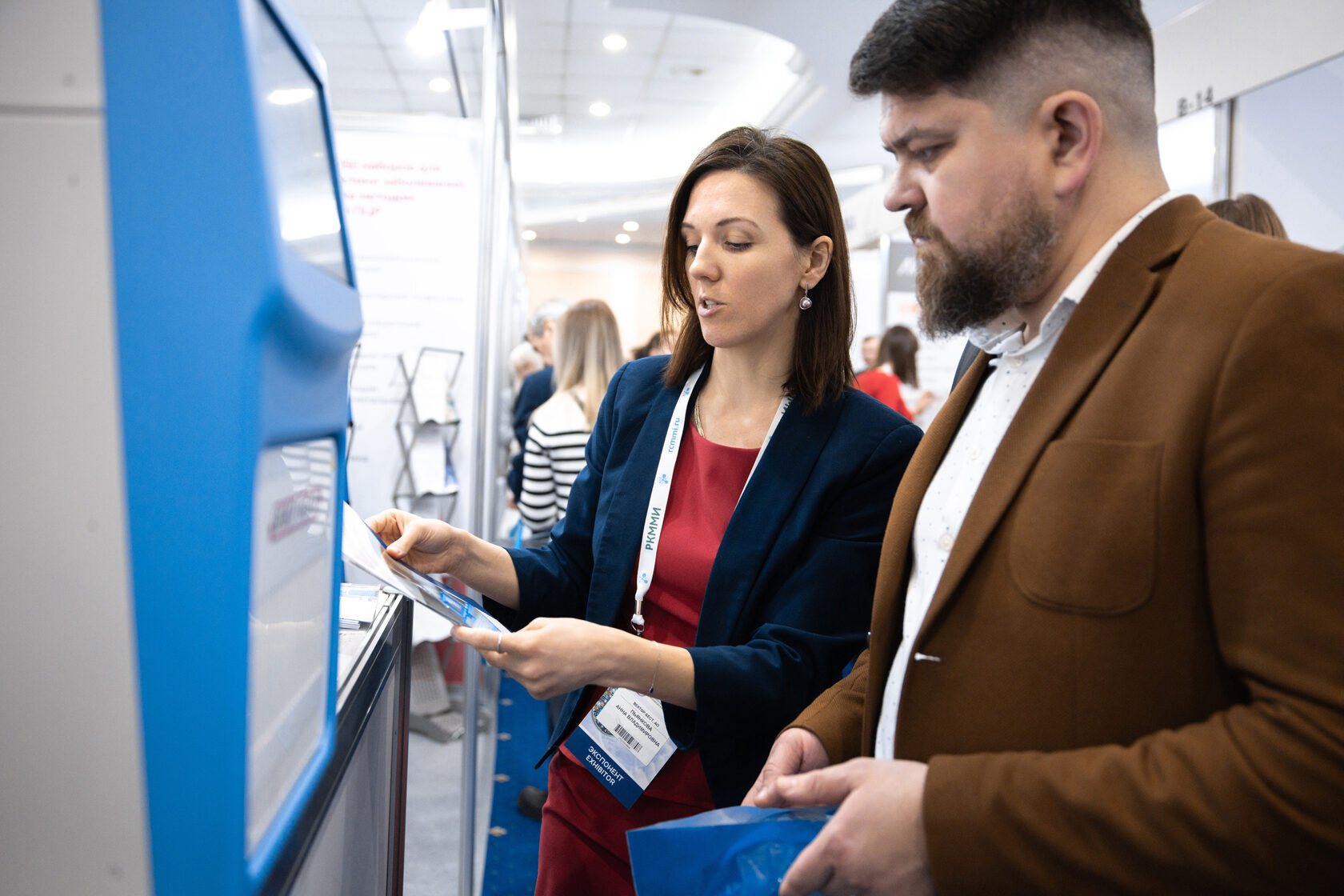
In 2025, the key partners of the RCMMS became the leading Russian companies such as: «Algimed», AVRORA AI, «DNA-Technology», and «Medica Group».
Looking forward to welcoming you next year!
- The «Algimed» company has been specializing in comprehensive laboratory equipment and services provision for over 20 years.
- AVRORA AI is a Russian developer of artificial intelligence-based solutions for analyzing microscopic laboratory and bacteriological studies.
- «DNA-Technology» is a leading Russian manufacturer of equipment and reagents for molecular genetic research using real-time PCR technology across the full technological cycle.
- «Medica Group» is part of the «Yunona» holding, a developing company supplying equipment and consumables for microbiological laboratories.
Looking forward to welcoming you next year!